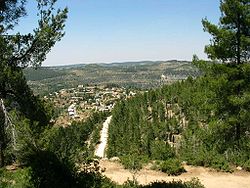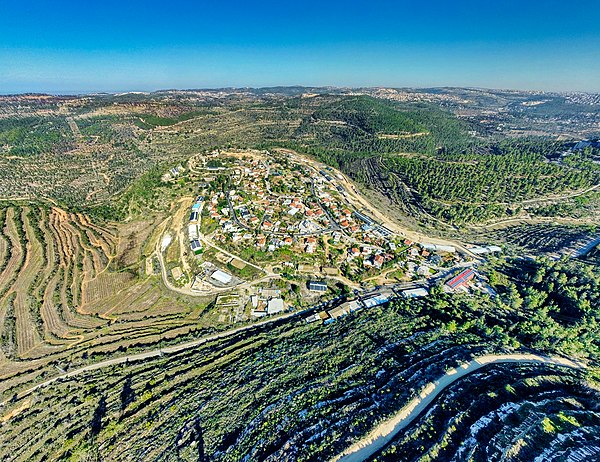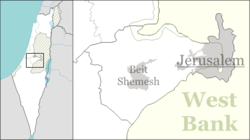Even Sapir
Even Sapir
אבן ספיר إيفن سابير | |
|---|---|
 | |
| Coordinates: 31°45′47″N 35°8′5″E / 31.76306°N 35.13472°E | |
| Country | Israel |
| District | Jerusalem |
| Council | Mateh Yehuda |
| Affiliation | Moshavim Movement |
| Founded | 1950 |
| Founded by | Kurdish Jews |
| Population (2022) | 699[1] |
Even Sapir (Hebrew: אֶבֶן סַפִּיר, lit. Sapphire) is a moshav in central Israel. Located on the outskirts of Jerusalem, it falls under the jurisdiction of Mateh Yehuda Regional Council. In 2022 it had a population of 699.[1]

History
[edit]Even Sapir was established in 1949 on land that had belonged to the depopulated Palestinian village of 'Ayn Karim.[2]
The moshav was founded by Hebrew repatriants returning from Kurdistan. The name was either taken from Even Sapir, a book written in 1864 by Yaakov Halevi Sapir, a Jerusalem rabbi and emissary,[3] which describes his travels to Yemen in the 19th century,[4] or it was named after Pinchas Sapir, Israel's finance minister, who encouraged Jewish businessmen from the Diaspora to invest in Palestine and the nascent state.[5]
To the north of the moshav is the Monastery of St. John in the Wilderness and a cave attributed to John the Baptist.[6]
Even Sapir is one end point of the Jerusalem Trail, a 42-kilometer walking route around and through Jerusalem, which intersects with the Israel National Trail. The point of intersection is just outside Even Sapir at the Ein Hindak spring.[7]
Even Sapir is a home to "Ben Gurion Institute of Science & Technology", Jerusalem Campus, a housing estate designated for 430 local and international students.[8]
References
[edit]- ^ a b "Regional Statistics". Israel Central Bureau of Statistics. Retrieved 21 March 2024.
- ^ Khalidi, W. (1992). All That Remains: The Palestinian Villages Occupied and Depopulated by Israel in 1948. Washington D.C.: Institute for Palestine Studies. p. 273. ISBN 0-88728-224-5.
- ^ HaReuveni, Immanuel (1999). Lexicon of the Land of Israel (in Hebrew). Miskal - Yedioth Ahronoth Books and Chemed Books. p. 19. ISBN 965-448-413-7.
- ^ A Journey to Teman
- ^ Judean mountains Esra Magazine
- ^ Go with the flow, The Jerusalem Post
- ^ Jerusalem Trail
- ^ "BGIST". Archived from the original on 2012-04-26. Retrieved 2011-12-20.

